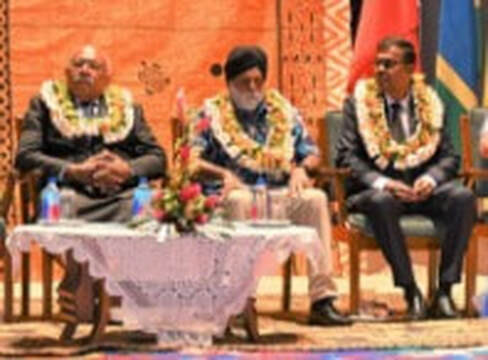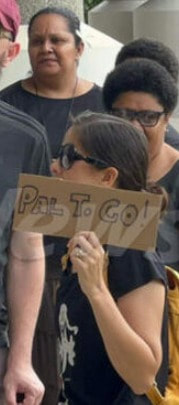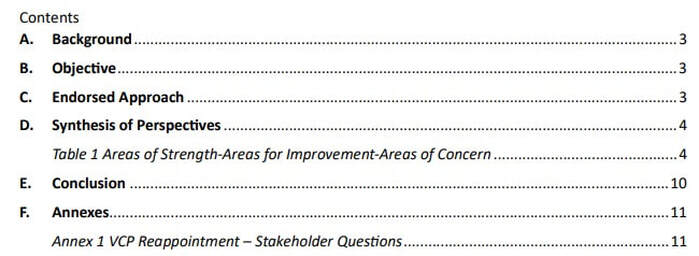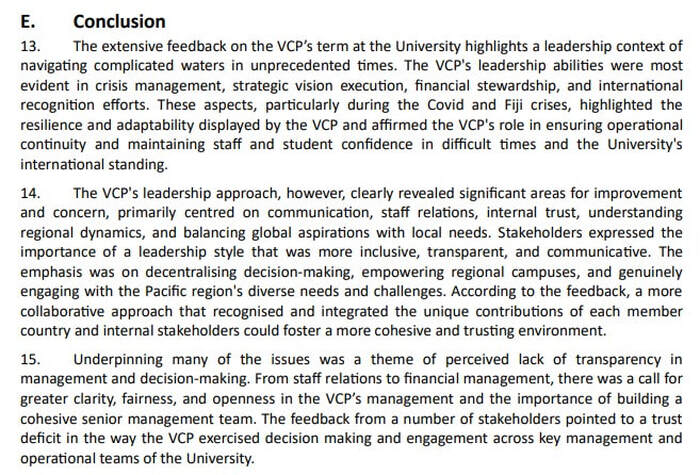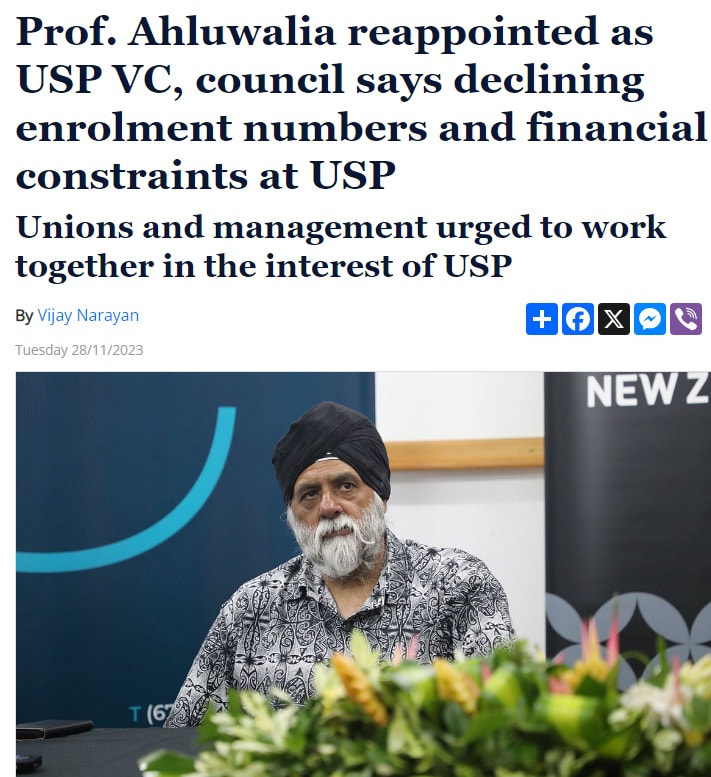*The USPSA having ballot for strike action next month. Ahluwalia is accused of running rings around the staff union, emboldened by 'Power of One Vote' that led to the formation of the Coalition government. He has refused to renew contracts of a few staff members or engage with them or their union representatives. He is accused of becoming authoritarian while wagging his fingers from Samoa.
Below is the Joint Committee and Senate Report of USP:
Joint Committee of Council and Senate Report to the University of the South Pacific Council on Stakeholders’ Interviews on the Reappointment of the Vice Chancellor and President of the University of the South Pacific,
October 2023
October 2023
A. Background
The Vice-Chancellor and President (“VCP”) of the University of the South Pacific (“USP”) began his appointment as VCP on January 1 2019..
On 5 August 2021, he was appointed to another 3-year term with the possibility of a further two-year term from 5 August 2024. As required by the Handbook on Council Appointments, a Joint Committee of Council and Senate (JCCS) had been appointed to bring a recommendation to Council on whether to extend the VCP’s term for a further two years.
In making its recommendation, the JCCS has considered a range of relevant material including the views of key stakeholders.
2. A sub-committee of the JCCS was formed and chaired by the Pro Chancellor. The sub-committee was tasked to facilitate face to face interviews and written responses from key stakeholders of the university.
Key stakeholders were identified across the levels of USP governance, management, and operations. Administrative support from outside the university was appointed to provide the notetaking and report summary support during stakeholder interviews and in receiving written responses.
B. Objective.
This report provides a synthesis of stakeholder perspectives compiled by the JCCS drawn from its engagement with key stakeholders and is submitted to the USP Council as part of their consideration and determination regarding the reappointment of the VCP.
Concern
LEADERSHIP
The VCP's leadership style was identified as an area of critical concern. While his crisis management skills were acknowledged, there was criticism around his approach, which was seen by many respondents as centralized, authoritarian, and reliant on personal loyalties. This approach created perceptions of divisiveness, with a lack of trust and a sense of disconnect felt among the staff. It appeared to contribute to a work environment where some staff felt disempowered or undervalued.
Feedback highlighted the VCP’s prolonged absence from Laucala campus as an area of real concern and creating much uncertainty across all areas of the VCP’s functions and responsibilities. Much of the uncertainty manifested in staff and students interpreting his decisions differently, coupled with what was being described as varying explanations on his decisions to management and to those close to him. There was acknowledgement that while his stay in Samoa amid the Fiji crisis was justified, the current situation required his regular presence at Laucala for effective leadership, especially since his anticipated return—following the revocation of his deportation order was marked as the onset of a "new era" for the University.
Strategic Vision
There were concerns about the VCP's focus on international rankings, potentially at the expense of regional needs, staff welfare, and internal community welfare. The emphasis on external achievements seemed to overshadow core educational quality, staff development, and the University's role within the specific socio-cultural and regional context of the Pacific.
Of critical concern, was the unaddressed issue of a significant downward shift of student EFTS.
A balance was needed between pursuing international standing and nurturing the fundamental aspects of academic life, such as teaching quality, student welfare, research outputs and sustaining healthy student numbers. This raised questions about the clarity of the VCP's long-term goals for the institution and the balance between global prestige and national/regional impact.
Staff Relations
The Vice-Chancellor and President (“VCP”) of the University of the South Pacific (“USP”) began his appointment as VCP on January 1 2019..
On 5 August 2021, he was appointed to another 3-year term with the possibility of a further two-year term from 5 August 2024. As required by the Handbook on Council Appointments, a Joint Committee of Council and Senate (JCCS) had been appointed to bring a recommendation to Council on whether to extend the VCP’s term for a further two years.
In making its recommendation, the JCCS has considered a range of relevant material including the views of key stakeholders.
2. A sub-committee of the JCCS was formed and chaired by the Pro Chancellor. The sub-committee was tasked to facilitate face to face interviews and written responses from key stakeholders of the university.
Key stakeholders were identified across the levels of USP governance, management, and operations. Administrative support from outside the university was appointed to provide the notetaking and report summary support during stakeholder interviews and in receiving written responses.
B. Objective.
This report provides a synthesis of stakeholder perspectives compiled by the JCCS drawn from its engagement with key stakeholders and is submitted to the USP Council as part of their consideration and determination regarding the reappointment of the VCP.
Concern
LEADERSHIP
The VCP's leadership style was identified as an area of critical concern. While his crisis management skills were acknowledged, there was criticism around his approach, which was seen by many respondents as centralized, authoritarian, and reliant on personal loyalties. This approach created perceptions of divisiveness, with a lack of trust and a sense of disconnect felt among the staff. It appeared to contribute to a work environment where some staff felt disempowered or undervalued.
Feedback highlighted the VCP’s prolonged absence from Laucala campus as an area of real concern and creating much uncertainty across all areas of the VCP’s functions and responsibilities. Much of the uncertainty manifested in staff and students interpreting his decisions differently, coupled with what was being described as varying explanations on his decisions to management and to those close to him. There was acknowledgement that while his stay in Samoa amid the Fiji crisis was justified, the current situation required his regular presence at Laucala for effective leadership, especially since his anticipated return—following the revocation of his deportation order was marked as the onset of a "new era" for the University.
Strategic Vision
There were concerns about the VCP's focus on international rankings, potentially at the expense of regional needs, staff welfare, and internal community welfare. The emphasis on external achievements seemed to overshadow core educational quality, staff development, and the University's role within the specific socio-cultural and regional context of the Pacific.
Of critical concern, was the unaddressed issue of a significant downward shift of student EFTS.
A balance was needed between pursuing international standing and nurturing the fundamental aspects of academic life, such as teaching quality, student welfare, research outputs and sustaining healthy student numbers. This raised questions about the clarity of the VCP's long-term goals for the institution and the balance between global prestige and national/regional impact.
Staff Relations
There was a clear indication of unrest and dissatisfaction among the University staff, stemming from several factors, including perceived unfairness in recruitment, promotions, inconsistency in policy application, and unaddressed human resource issues, including the failure to address issues of gender equality in staff recruitment and in leadership. These concerns, coupled with the sense of not being heard or valued, have affected staff morale and, potentially staff retention. This signalled an unstable University environment that required urgent attention.
International and Regional Focus
Feedback indicated a gap in the VCP's engagement with the broader Pacific region and the individual challenges and dynamics of member countries.
There was a sense that the University could be drifting from its core mission and values, particularly its relevance and responsibility to the region it serves. Strengthening relationships with regional entities and demonstrating a nuanced understanding of the Pacific's socio-political landscape was seen as crucial.
External Stakeholder Relations
A recurring theme was the need for improved communication and deeper engagement with various stakeholders, including staff, regional campuses, and member countries. The feedback indicated situations where individuals and groups often felt left out of the decision-making process or were unclear about the VCP's vision and decisions. The lack of inclusive communication and consultation contributed to mistrust, speculation, and a feeling of disconnect between the VCP’s office and other parts of the University community.
International and Regional Focus
Feedback indicated a gap in the VCP's engagement with the broader Pacific region and the individual challenges and dynamics of member countries.
There was a sense that the University could be drifting from its core mission and values, particularly its relevance and responsibility to the region it serves. Strengthening relationships with regional entities and demonstrating a nuanced understanding of the Pacific's socio-political landscape was seen as crucial.
External Stakeholder Relations
A recurring theme was the need for improved communication and deeper engagement with various stakeholders, including staff, regional campuses, and member countries. The feedback indicated situations where individuals and groups often felt left out of the decision-making process or were unclear about the VCP's vision and decisions. The lack of inclusive communication and consultation contributed to mistrust, speculation, and a feeling of disconnect between the VCP’s office and other parts of the University community.
